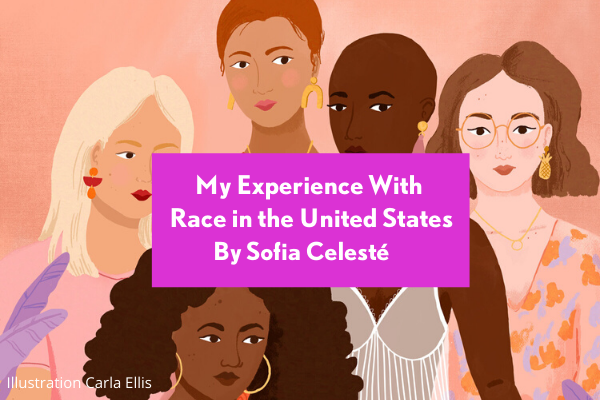As a young woman entering my twenties, I look back on my childhood with such fondness. It seems like just yesterday my mama was braiding my curls and my dad was packing last night’s arroz con frijoles into my lunch bag. I close my eyes and remember the rhythms of La Sonora Matancera and Celia Cruz playing on repeat. I can imagine Abuela’s kitchen table, surrounded by my tios, sharing their week’s stories. I dream up Saturday mornings at the hair salon, the smells of Agua de Florida and castor oil gracing my nose. Throughout growing up, a lot has changed. My relationship with identity and race have been consistently evolving. Loving myself is a challenge and being confident in who I am is a journey that is never ending.
My name is Sofia Celesté and I am a proud daughter of Afro-Peruvian mother and Italian father. Coming from a mixed family, my brother and I have both gone through our own forms of identity crises. Being the only two biracial kids, we always felt different. To our mom’s side, we were the two American niños with the gringo father. To our dad’s side, we were looked at as if we were pieces of art in a museum: unfathomable to the eye and something you couldn’t fully comprehend. I don’t think it was ever intentional for our families to make us feel uncomfortable, but it was definitely a result. Insecurity in not looking like everyone else made me look at myself differently and had me questioning who I wanted to be.
Outside of my family, specifically in school, I made it a goal to blend in. A majority of the kids, from elementary through high school, fit into one category. A lot of them had beautiful light eyes, fair skin and silky blonde hair. I could find more similarities between a lot of my peers and my father than I could ever find between me and him. It was a mixture of little comments here and there from my family and judgement from my classmates that impacted what came next.
I substituted English for Spanish. I replaced my mama’s cooking with PB&J’s. I chose Dower and hid Vasquez.
Like many other girls with textured hair, it began with me hating my curls. Despising the thick waves and loose ringlets running from the top of my head to the smalls of my back. It was a gradual process but when I look back on pictures, I don’t recognize that girl. I grew up with the notion that my hair was precious. As a matter of fact, I took pride in it. It carried the stories of those who came before me and hundreds of years of hurt. My mother would always say, “hay sangre en tu pelo.” There’s blood in your hair. By my tenth birthday, my mom finally gave in and let me get my first keratin treatment. The chemical mixture made my scalp burn and I could hear my ancestors cry. For the next six years, I chose to relax, straighten, blow out, and erase the heritage out of my hair.
Next came my skin. Being raised and surrounded by predominantly brown women, I couldn’t help but admire our melanin. I saw the confidence it brought my mother, my tias, and my Abuela. Our skin was a gift from the sun and my caramel color is sacred. I hate to admit that there was a point in time where I felt the need to cover it up, to not only change my hair but colonize my complexion. Instead of lathering my face with almond oil, I layered it with a porcelain foundation that was nowhere near my skin tone. I found solace in hiding behind a mask and didn’t see the damage I was causing myself. I chose to ignore the hurt in my grandmother’s eyes and brush away any pride I had of holding the sun within my skin. What happens when brown girls can’t learn how to love themselves brown?
It took me six years to realize that I was pretending to be someone I wasn’t. I found comfort in making my essence smooth enough to swallow, I could tell by their faces I was no longer a hard pill of avoidance. I made it so I would be the only one rejecting and hating parts of myself. Behind closed doors, in my own rejection, and in others shadows is where I became fierce enough to love myself in all my entirety.
I am Sofia Celesté Dower-Vasquez. A young biracial woman with big dreams who washes herself in her poems. A bruja who heals the hurt of her ancestors through loving herself. And I am divine feminine energy.

Sofia Celesté Dower-Vasquez is a Peruvian- American poet from Richmond, California. The East Bay Area native has spent the last two years studying at the University of Hawai’i, double majoring in Psychology & Ethnic Studies. Throughout her time on the island, Sofia has continued to explore her connection with poetry. Growing up in a family where self expression
was strongly encouraged, Sofia picked up the art of storytelling. In her work, she focuses on the divine energy that has surrounded her and shaped the woman she has grown up to be.

